Station z positions from the December 2011 survey
The files we have from the surveys done in Chemistry are
zipped up here. For each disk, they
look like this (this is file ST0-NW.txt):
DATUM_B -0.000000, -0.018996, -7.917148, 0.100707 S0_PIN3, 1.517816, -7.913124, -3.675052 S0_PIN2, 3.934753, -7.921794, -0.519313 S0_PIN1, 1.509278, -7.925404, 3.671518 PNT56, 0.361544, -7.911616, -3.565323 PNT57, 0.200052, -7.914775, -1.599845 PNT58, -0.223373, -7.919537, 1.591026 PNT59, -0.372915, -7.922602, 3.557912 PT1, 0.708007, -7.513434, -3.627784 PT2, 0.328333, -7.515392, -1.712858 PT3, 0.753995, -7.671477, -1.565260 PT4, 1.610310, -7.674214, -3.319559 ... ... PT49, -0.124943, -8.307491, 1.725705 PT48 -0.257713, -8.311505, 3.673295The ones with PIN1,2,3 (A in the figure) and PNT56,7,8,9 (B and C) clearly are points on the disk perimeter, and the 48 that follow are on individual wedges. Points A correspond to precision holes drilled to accept survey pins. These pins were designed to protrude from the cage, and a survey mark would then be visible to the telescope-based survey system that was in use at the time of the FVTX design. However, by 2011, this system was replaced by a touch-based machine, which could reach through the cage openings and touch the precision holes themselves, so the survey pins were no longer used. Points B correspond to threaded holes where the transfer fixture connects. Points C are somewhere on the surface of the disk edge, but there is no well-defined place in z or y where this would be. On the right is an x-y plot of the 7 points on the disk (red), with a representation of a disk superimposed. | 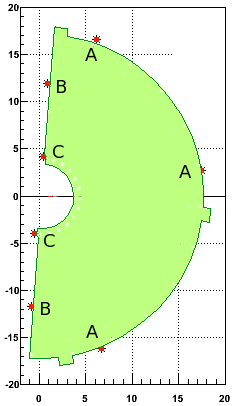
| |||||||||||||||||||||||||||||||||||||||||||||||||||||||||||||||
Take the average of the 7 points for each disk, and compare them with the design values:
cage local
station measured ->cm design delta(cm) ->μm mean delta
------------------------------------------------------------------------------
ST0-NW -7.91840000 -20.11273600 -20.11 -0.00273 -27 -251 224
ST1-NW -10.29898014 -26.15940956 -26.14 -0.01940 -194 57
ST2-NW -12.69863229 -32.25452602 -32.17 -0.08452 -845 -594
ST3-NW -15.02977714 -38.17563394 -38.20 0.02436 244 495
ST0-SW 7.91670542 20.10843179 20.11 -0.00156 -16 133 -149
ST1-SW 10.31122814 26.19051948 26.14 0.05051 505 372
ST2-SW 12.66787614 32.17640540 32.17 0.00640 64 -69
ST3-SW 15.03856514 38.19795546 38.20 -0.00204 -20 -153
ST0-NE -7.91313314 -20.09935818 -20.11 0.01064 106 -48 154
ST1-NE -10.29569529 -26.15106604 -26.14 -0.01106 -111 -63
ST2-NE -12.67112986 -32.18466984 -32.17 -0.01466 -147 -99
ST3-NE -15.04074014 -38.20347996 -38.20 -0.00347 -35 13
ST0-SE 7.92572857 20.13135057 20.11 0.02135 214 306 -92
ST1-SE 10.30396786 26.17207836 26.14 0.03207 321 15
ST2-SE 12.70120057 32.26104945 32.17 0.09104 910 604
ST3-SE 15.04272414 38.20851932 38.20 0.00851 85 -221
The 'local delta' is the difference in each cage between the cage average and the
disk delta. This would show if for example disk3 is always shifted in the same way
in each cage. No such systematic pattern is seen.
| ||||||||||||||||||||||||||||||||||||||||||||||||||||||||||||||||
Deviations are large, some almost 1mm. The 4 holes along the straight edge are threaded screw holes for the transfer fixture. The 3 on the perimeter are precision holes. Using only those 3 points, the deviations are:
cage local
station measured ->cm design delta(μm) mean delta
-----------------------------------------------------------------
ST0-NW -7.920107 -20.11707 -20.11 -71 -224 153
ST1-NW -10.302855 -26.16925 -26.14 -293 -69
ST2-NW -12.686931 -32.22480 -32.17 -548 -324
ST3-NW -15.038646 -38.19816 -38.20 18 242
ST0-SW 7.919842 20.11639 20.11 64 272 -208
ST1-SW 10.313671 26.19672 26.14 567 295
ST2-SW 12.674349 32.19284 32.17 228 -44
ST3-SW 15.048441 38.22304 38.20 230 -42
ST0-NE -7.928107 -20.13739 -20.11 -274 -589 315
ST1-NE -10.319777 -26.21223 -26.14 -722 -133
ST2_NE -12.692989 -32.24019 -32.17 -702 -113
ST3-NE -15.065276 -38.26580 -38.20 -658 -69
ST0-SE 7.925278 20.13020 20.11 202 367 -165
ST1-SE 10.306207 26.17776 26.14 378 11
ST2-SE 12.690118 32.23289 32.17 629 262
ST3-SE 15.049515 38.22576 38.20 258 -109
| 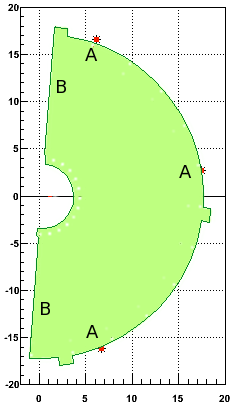
| |||||||||||||||||||||||||||||||||||||||||||||||||||||||||||||||
Same exercise, but now only omitting the ill-defined 'C' points:
cage local
station measured ->cm design delta(um) mean delta
-----------------------------------------------------------
ST0-NW -7.9189 -20.11402 -20.11 -40 -210 170
ST1-NW -10.300 -26.16231 -26.14 -223 -13
ST2-NW -12.695 -32.24561 -32.17 -756 -546
ST3-NW -15.032 -38.18238 -38.20 176 386
ST0-SW 7.9176 20.11081 20.11 8 175 -167
ST1-SW 10.311 26.19243 26.14 524 349
ST2-SW 12.669 32.18134 32.17 113 -62
ST3-SW 15.041 38.20548 38.20 55 -120
ST0-NE -7.9176 -20.11078 -20.11 -9 -209 200
ST1-NE -10.302 -26.16940 -26.14 -294 -85
ST2-NE -12.677 -32.20133 -32.17 -313 -104
ST3-NE -15.048 -38.22214 -38.20 -221 -12
ST0-SE 7.9255 20.13097 20.11 210 378 -168
ST1-SE 10.304 26.17378 26.14 338 -40
ST2-SE 12.697 32.25260 32.17 826 448
ST3-SE 15.044 38.21369 38.20 137 -241
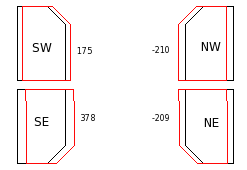
| 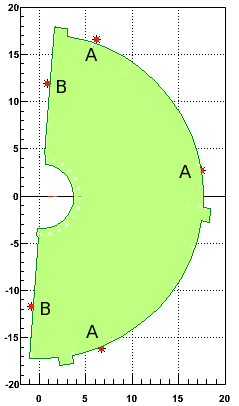
| |||||||||||||||||||||||||||||||||||||||||||||||||||||||||||||||
Note some of these measurements were done during the "pre-survey', which is the stage before integration into the master frame with the VTX (pictures here). The cages are then still in the assembly frame. The reason is that the survey points (the 3 precision holes where the survey pins would have gone) can be reached through openings in the cage only before the integration with the VTX (see this page for the survey pins). From this pre-survey the only values that are significant are the relative placements of the disks inside a cage. No other surveys were done to fix the station z positions. | 
| |||||||||||||||||||||||||||||||||||||||||||||||||||||||||||||||
Using the relative z positions of the disks (red numbers in the table above), the alignment software gives these results: 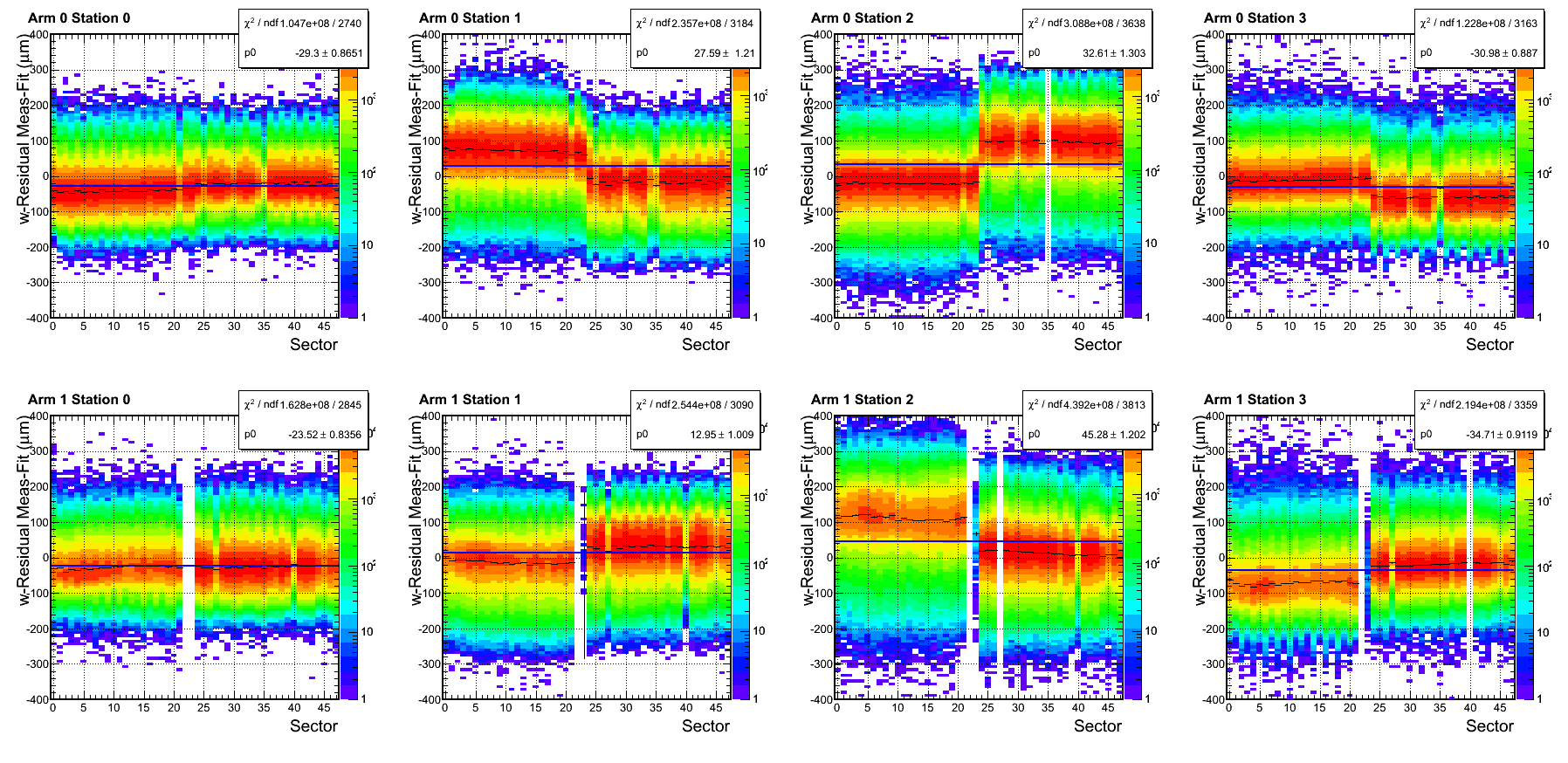
The parallel shifts of blocks of residues shows a uniform growth in r, which is unphysical, but can also be caused by a bad placement in z. So the z survey numbers we have appear not to be usable. | ||||||||||||||||||||||||||||||||||||||||||||||||||||||||||||||||
| In November 2013 a survey was done to determine the z-positions of the half-disk, after integration with the VTX. Since the precision points are buried, the measurements were done by touching the upstream and downstream surfaces of the disks, where they are exposed near the center plane. In some cases, also a disk surface was reachable near the mounting tabs. The reference system was derived from fixed points on the master frame and support structure, which are fixed from year to year.
There appears to be one outlier, SW3, and the N and S cages appear to be abour 200μm closer together than the design distance. | 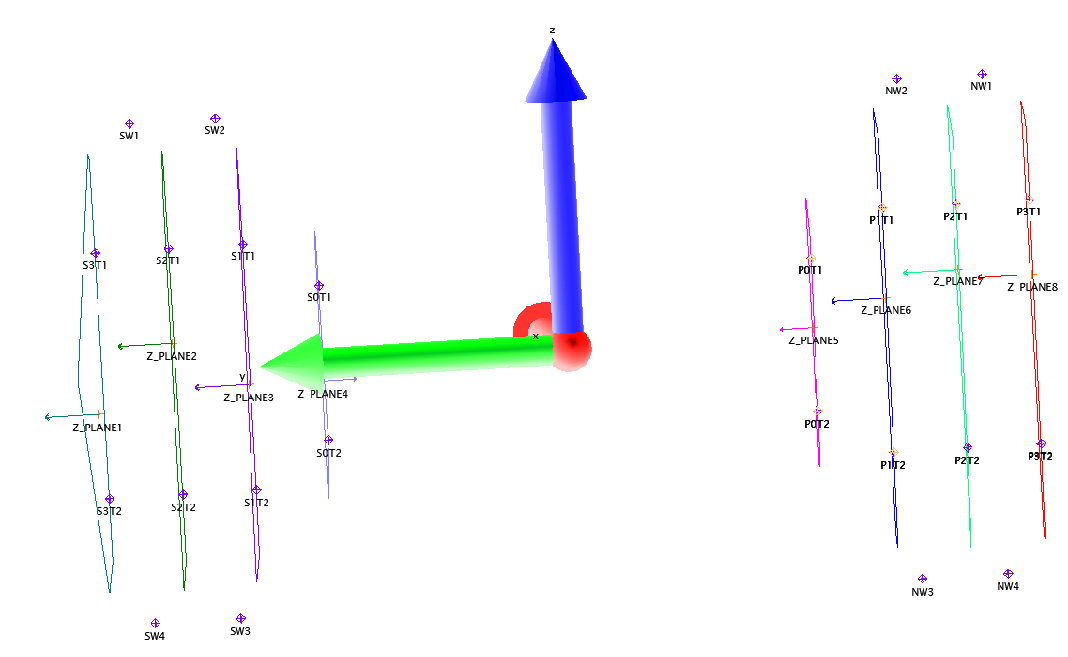

| |||||||||||||||||||||||||||||||||||||||||||||||||||||||||||||||
Same for the East half:
| 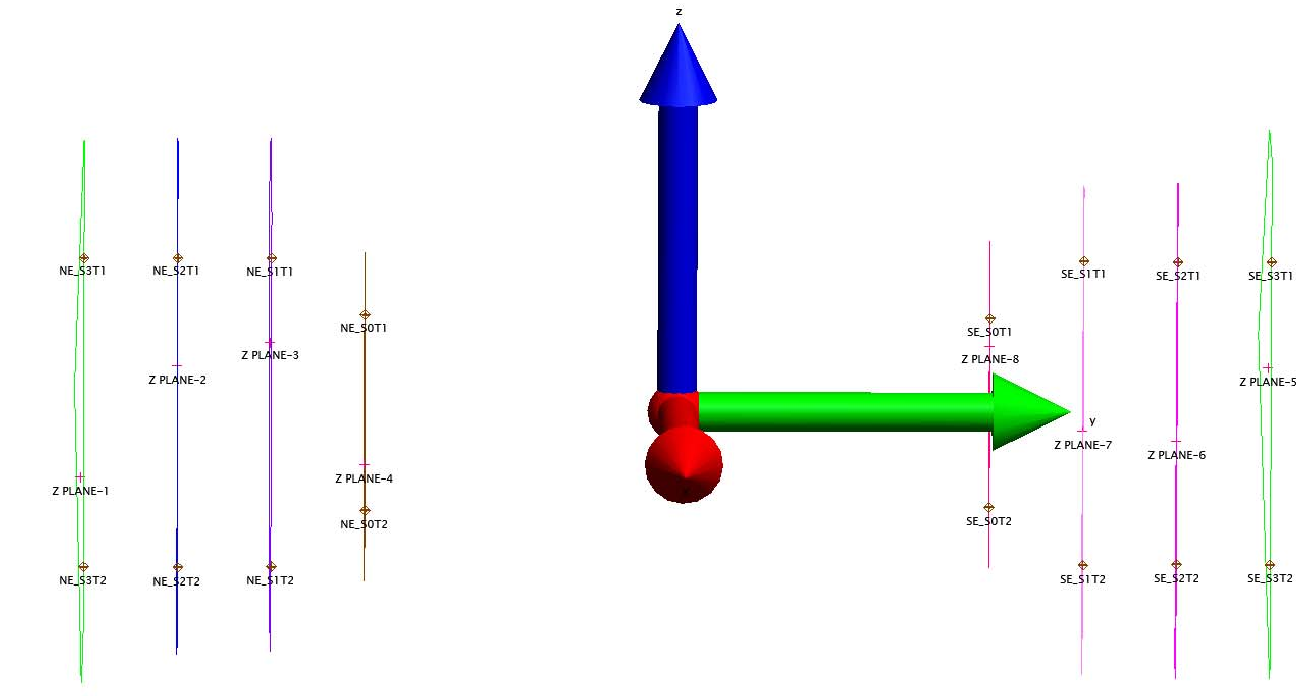

|
|||||||||||||||||||||||||||||||||||||||||||||||||||||||||||||||
Hubert Van Hecke Last modified: Fri Nov 22 15:58:26 MST 2013